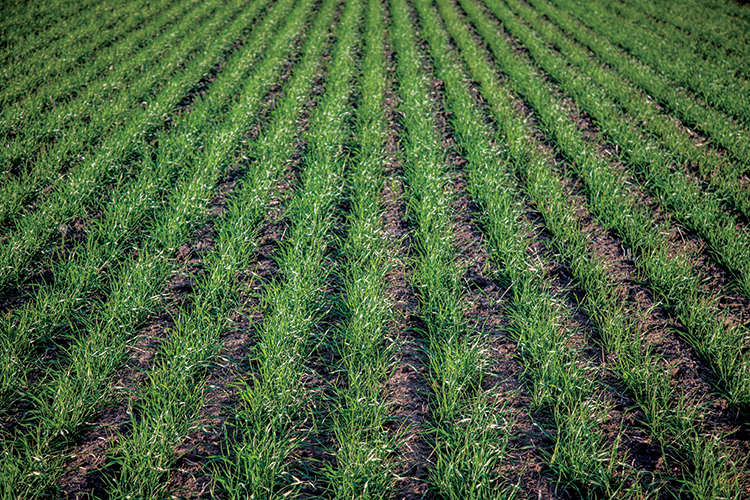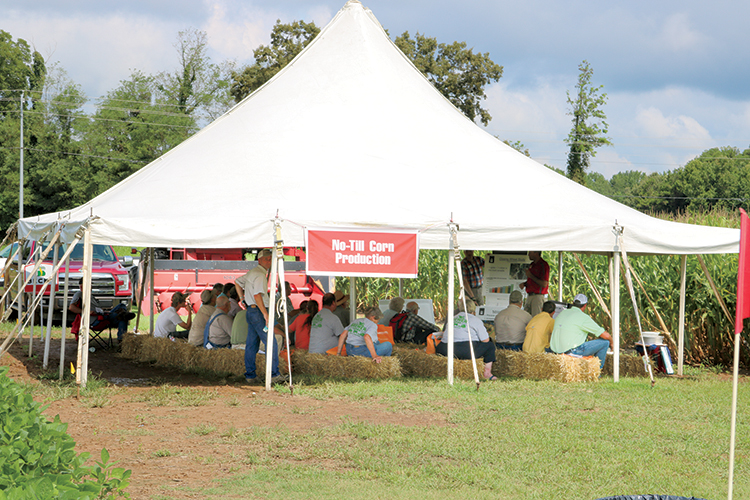Home > Tennessee > Tennessee Environment > How Farmers are Saving the Soil in Tennessee
How Farmers are Saving the Soil in Tennessee
In partnership with: Tennessee Department of Agriculture

Tennessee farmers have been transforming the landscape for decades with no-till farming methods, helping to restore the state’s soils. In fact, the University of Tennessee’s Research and Education Center at Milan has been a leader in this effort since 1981. The research conducted by UT AgResearch at Milan is known worldwide.
While no-till farming is the norm in Tennessee today, it hasn’t always been the case. “About four decades ago, West Tennessee was ranked as one of the top areas in the U.S. for the highest soil erosion rate,” says Don Tyler, retired professor for the University of Tennessee Institute of Agriculture. The average soil erosion rate for Tennessee at that time was 40 tons of soil per acre per year.
Unlike tillage, commonly known as plowing, no-till methods leave soils undisturbed, allowing crop residue to remain on the surface, protecting the topsoil from runoff. Seeds are planted in rows in the soil. In contrast, tillage leaves soil “bare” and highly susceptible to erosion.
Some soils across Tennessee are considered fragile, Tyler says, but West Tennessee’s are especially susceptible.
“The soils in West Tennessee are especially erodible because they are very silty soils,” Tyler says. “They are almost like talcum powder – very silty and easily moved by water if they’re exposed and tilled.”
As an example of how easily soil can erode with tilling versus no-till, Tyler says, “We have data that shows in till systems, one storm can result in the loss of more than 10 tons of soil per acre, whereas a no-till system right beside it with the same measurements may result in 1/10 of a ton loss. It’s a huge difference.”

Today, Tennessee is a shining example of the no-till success, with up to 90 percent of the state’s farms using no-till practices, according to the USDA National Agricultural Statistics Service. This change was possible thanks to the assistance and innovation of the University
of Tennessee Extension and UT AgResearch, within the University of Tennessee Institute of Agriculture, and Tennessee’s row crop farmers who saw the benefits and invested in the technology to make no-till a reality.
Tyler was one of the many team members enlisted to research and help Tennessee adapt its tilling ways that were having a negative impact on the land.
“With no-till, we’ve dramatically reduced the manmade accelerated soil erosion,” Tyler says. “A lot of the soil that we have now in the state would not be here if we did not go no-till. The soil was eroding at such a high rate, and there would be fields today that would have been abandoned if we did not make the change. We have many farmers now who have been completely no-till for 30 years,” he adds.
Huge Benefits
Farming in Dyer and Lauderdale counties, along the Mississippi River, Jimmy Moody experienced firsthand the positive changes that no-till methods brought to his West Tennessee farm.
Moody, who is in his mid-60s, farms on his own family operation and at Cold Creek Farms with a business partner, growing soybeans and cotton. Back when he used to till all of his land, he would need to burn crop residue, till soil and plow weeds. But since he took up no-till, he directly plants crops and controls weeds with advanced herbicides that were unavailable several decades back.
“When I was young, using no-till was unheard of,” Moody says.
No-till is good for the soil, reducing soil erosion and increasing organic matter in the surface soil. Plus, it encourages flourishing earthworm populations – which are a great indicator of soil health and create channels to flow water into soil and reduce runoff. No-till farming has economic benefits, too.
“Farmers using no-till are minimizing their labor needs, the time it takes to actually farm, reducing fuel costs dramatically, and a lot of them can farm on a much larger scale than they would be able to otherwise, which has almost become necessary to survive,” Tyler says.
Moody agrees. “There’s no way that I could be farming on the scale that I am today without no-till farming,” he says.



